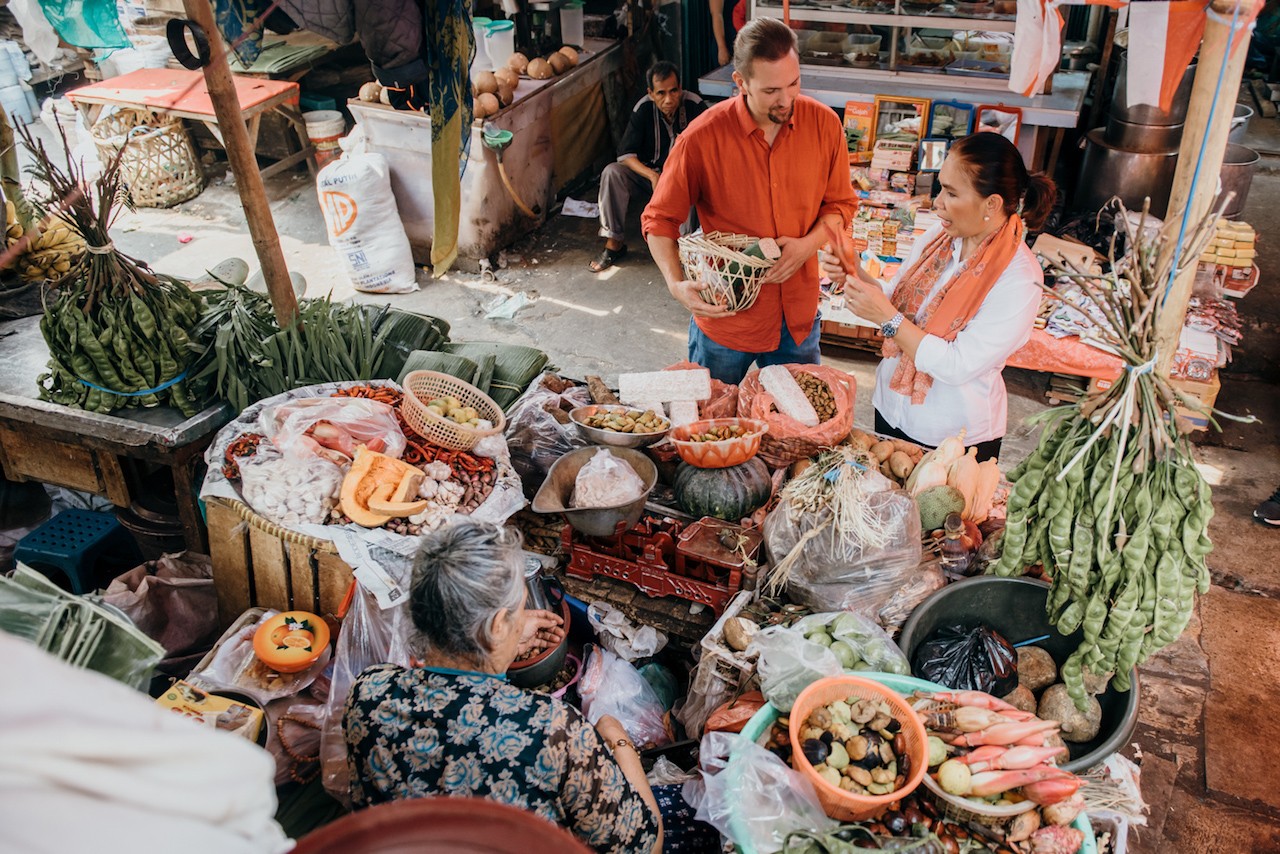Delightful Indo-German fusion cuisine
An Indonesian self-taught chef and a German chef team up to present fusion food with no confusion.
Change Size
 Petty Elliott (right) explains about Indonesian ingredients to Helge Hagemann during a visit to Teluk Gong market prior to Magic Hour Dinner at GoetheHaus Jakarta. They bought black nuts and coconuts at the market. (Goethe-Institut Indonesien/File)
Petty Elliott (right) explains about Indonesian ingredients to Helge Hagemann during a visit to Teluk Gong market prior to Magic Hour Dinner at GoetheHaus Jakarta. They bought black nuts and coconuts at the market. (Goethe-Institut Indonesien/File)
A
s the holidays draw near, it would be hard not to think about food. From comforting meals at family gatherings to delicious restaurant fare. Indeed, nothing connects people from different backgrounds and cultures better than a pleasurable meal.
“Food brings people together and transcends cultural barriers, as the art of dining is a universal language that anyone can understand,” writes the program book of Wanderlust Kuche, a culinary dialogue recently held by Goethe-Institut Indonesien.
Taking place in the inner courtyard of GoetheHaus Jakarta, the culinary dialogue becomes manifest in a pop-up restaurant titled Magic Hour Dinner, featuring Petty Elliott and Helge Hagemann. The Manado, North Sulawesi-born Petty is an Indonesian food writer, culinary teacher and self-taught chef, while Helge is a member of Werteköche, a Hamburg-based collective of German chefs with initiatives that put forward the love of cooking, good food and mindful, responsible culinary practice.
The Magic Hour Dinner carried a mission to create a unique fusion of German and Indonesian cuisine, where the different culinary traditions of the two countries are combined to create new dishes. While Indonesia is known for its rich and diverse culinary heritage, Germany is more generally known for its Bavarian cuisine including sausages, pork knuckles, sauerkraut, pretzel and beer. However, no classic Indonesian or Bavarian cuisine was present on people's plates that evening.
Read also: Mexican regional cuisine drives booming food scene
One of the main courses was beef tartar rendang sauce, with the chopped fresh meat being balanced with pomelo, pineapple, edible flowers and rempeyek peanut crisps. The rendang sauce on the side wraps up all the flavor combinations.
Slow braised chicken with young nutmeg and clove leaves, bread dumplings, onion cream, walnut and grapes was to follow. The protein has a good quality similar to that of perfectly grilled chicken, with an appetizing smoky aroma and generous sauce that gives adequate moisture. While Indonesia’s nutmeg and clove leaves enhance flavor, bits of red and green grapes give fresh surprises. The bread dumplings, with a hint of mushroom, represent world renown German bread.
The dinner closes with caramelized spice apple, a dish of apple slices topped with speculaas crumbles, its ginger flavor and aroma a reminder of Christmas that is coming in just a few weeks.
Petty said the speculaas element was indeed related to her family’s Christmas celebration in Manado.
“It is also the tradition in Germany although they don’t call it speculaas,” Petty told The Jakarta Post.
She went on to say that the most interesting thing for her about the collaboration was learning more about regional German cuisine.
“He [Helge] is from Hamburg and apparently the classic dishes are more seafood and fish. Also, it is a privilege for me to give him information about regional Indonesian cuisine and the unusual ingredients. And to have a perfect main course as our collaboration. We never tried or cooked the dishes together before, we just each give our ideas and creativity, and I am so happy it worked well,” Petty recalls.
Petty, who was recently accepted as a member of the UK Guild of Food Writers, also said it was important to have a good culinary dialogue with a positive attitude, professionalism, open mind, good communication and respect for both of the food cultures.
“We work as a team rather than as individuals,” said Petty.









